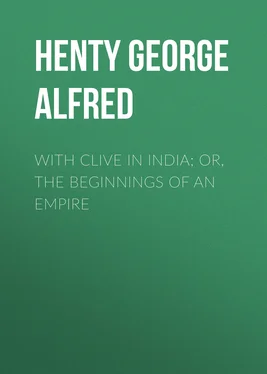George Henty - With Clive in India; Or, The Beginnings of an Empire
Здесь есть возможность читать онлайн «George Henty - With Clive in India; Or, The Beginnings of an Empire» — ознакомительный отрывок электронной книги совершенно бесплатно, а после прочтения отрывка купить полную версию. В некоторых случаях можно слушать аудио, скачать через торрент в формате fb2 и присутствует краткое содержание. Жанр: foreign_children, foreign_antique, foreign_prose, prose_military, на английском языке. Описание произведения, (предисловие) а так же отзывы посетителей доступны на портале библиотеки ЛибКат.
- Название:With Clive in India; Or, The Beginnings of an Empire
- Автор:
- Жанр:
- Год:неизвестен
- ISBN:нет данных
- Рейтинг книги:5 / 5. Голосов: 1
-
Избранное:Добавить в избранное
- Отзывы:
-
Ваша оценка:
- 100
- 1
- 2
- 3
- 4
- 5
With Clive in India; Or, The Beginnings of an Empire: краткое содержание, описание и аннотация
Предлагаем к чтению аннотацию, описание, краткое содержание или предисловие (зависит от того, что написал сам автор книги «With Clive in India; Or, The Beginnings of an Empire»). Если вы не нашли необходимую информацию о книге — напишите в комментариях, мы постараемся отыскать её.
With Clive in India; Or, The Beginnings of an Empire — читать онлайн ознакомительный отрывок
Ниже представлен текст книги, разбитый по страницам. Система сохранения места последней прочитанной страницы, позволяет с удобством читать онлайн бесплатно книгу «With Clive in India; Or, The Beginnings of an Empire», без необходимости каждый раз заново искать на чём Вы остановились. Поставьте закладку, и сможете в любой момент перейти на страницу, на которой закончили чтение.
Интервал:
Закладка:
"Now, go upstairs at once to your mother. I have letters to write, and am too busy for talking."
So saying, with a peremptory wave of his hand he dismissed his nephew.
"Well, Mother," Charlie said, after telling her of his uncle's generosity, "thank goodness you will be all right now, anyhow. No doubt Uncle intends to do something for you and the girls, though he has said nothing at present, beyond the fact that you are not to be in wretched lodgings, and they are not to go out as governesses. But even if he should change his mind, and I don't think he ever does that, I shall be able to help you.
"Oh, he is kind, isn't he?"
The parting was far less sad than that which had taken place at Yarmouth. Charlie was now assured that his mother and sisters would be comfortable, and well cared for in his absence; while his mother, happy in the lightening of her anxiety as to the future of her daughters, and as to the prospects of her son, was able to bear with better heart the thought of their long separation.
Mrs. Marryat and the girls accompanied him on board ship. Mr. Tufton declined to join the party, under the plea that, in the first place, he was busy; and in the second, that he feared there would be an emotional display. He sent, however, his head clerk with them, to escort the ladies on their return from the docks.
The Lizzie Anderson was a fine ship, of the largest size, and she was almost as clean and trim as a man of war. She carried twelve cannon, two of them thirty-two pounders, which were in those days considered large pieces of ordnance. All the ships of the Company, and, indeed, all ocean-going merchantmen of the day, were armed, as the sea swarmed with privateers, and the black flag of the pirates was still occasionally to be seen.
The girls were delighted with all they saw, as, indeed, was Charlie; for accustomed, as they were, only to the coasting vessels which frequented the port of Yarmouth, this floating castle appeared to them a vessel of stupendous size and power.
This was Charlie's first visit, also, to the ship, for his uncle had told him that all directions had been given, that the trunks with the things necessary for the voyage would be found in his cabin, at the time of starting, and the rest of the luggage in the hold. Everything was in order, and Charlie found that his cabin companion was a doctor in the service, returning to Madras. He was a pleasant man, of some five or six and thirty, and assured Mrs. Marryat that he would soon make her son at home on board ship, and would, moreover, put him up to the ways of things upon his arrival in India. There were many visitors on board, saying goodbye to their friends, and all sat down to lunch, served in the saloon.
When this was over, the bell rang for visitors to go ashore. There was a short scene of parting, in which Charlie was not ashamed to use his handkerchief as freely as did his mother and sisters. Five minutes later, the great vessel passed through the dock gates. Charlie stood at the stern, waving his handkerchief as long as he could catch a glimpse of the figures of his family; and then as, with her sails spread and the tide gaining strength every minute beneath her, the vessel made her way down the river, he turned round to examine his fellow passengers.
These were some twenty in number, and for the most part men. Almost all were, in some capacity or other, civil or military, in the service of the Company; for at that time their monopoly was a rigid one, and none outside its boundary were allowed to trade in India. The Company was, indeed, solely a great mercantile house of business. They had their own ships, their own establishments, and bought and sold goods like other traders. They owned a small extent of country, round their three great trading towns; and kept up a little army, composed of two or three white regiments; and as many composed of natives, trained and disciplined like Europeans, and known as Sepoys. Hence the clergyman, the doctor, a member of the council of Madras, four or five military officers, twice as many civilians, and three young writers, besides Charlie, were all in the employment of the Company.
"Well, youngster," a cheery voice said beside him, "take your last look at the smoke of London, for it will be a good many years before you see it again, my lad. You've blue skies and clear ones where you're going, except when it rains, and when it does there is no mistake about it."
The speaker was the captain of the Lizzie Anderson, a fine sailor-like man of some fifty years, of which near forty had been spent in the service of the Company.
"I'm not a Londoner," Charlie said, smiling, "and have no regret for leaving its smoke. Do you think we shall make a quick voyage?"
"I hope so," the captain said, "but it all depends upon the wind. A finer ship never floated than the Lizzie Anderson; but the Company don't build their vessels for speed, and it's no use trying to run, when you meet a Frenchman. Those fellows understand how to build ships, and if they could fight them as well as they build them, we should not long be mistress of the sea."
Most of the people on board appeared to know each other, and Charlie felt rather lonely, till the doctor came up and began to chat with him. He told him who most of his fellow passengers were:
"That gentleman there, walking on the other side of the deck, as if not only the ship but the river and banks on both sides belonged to him, is one of the council. That is his wife over there, with a companion holding her shawl for her. That pretty little woman, next to her, is the wife of Captain Tibbets, the tall man leaning against the bulwarks. Those two sisters are going out to keep house for their uncle, one of the leading men in Madras; and, I suppose, to get husbands, which they will most likely do before they have been there many weeks. They look very nice girls.
"But you soon get acquainted with them all. It is surprising how soon people get friendly on board ship, though, as a rule, they quarrel like cats and dogs before they get to the end of it."
"What do they quarrel about?" Charlie asked, surprised.
"Oh, about anything or nothing," the doctor said. "They all get heartily sick of each other, and of the voyage, and they quarrel because they have nothing else to do. You will see, we shall be as happy a party as possible till we get about as far as the Cape. After that, the rows will begin, and by the time we get to India, half the people won't speak to each other.
"Have you been down the river before? That's Gravesend. I see the captain is getting ready to anchor. So, I suppose the tide has nearly run out. If this wind holds, we shall be fairly out at sea when you get up tomorrow.
"You snore, I hope?"
"No, sir, I don't think so," Charlie said.
"I hoped you did," the doctor said, "because I'm told I do, sometimes. However, as I usually smoke a cigar on deck, the last thing, I hope you will be fairly asleep before I am. If at any time I get very bad, and keep you awake, you must shake me."
Charlie said it took a good deal to keep him awake, and that he should probably get accustomed to it, ere long.
"It's better to do that," he said with a laugh, "than to keep on waking you, for the next four or five months."
A week later, the Lizzie Anderson was running down the Spanish coast, with all sail set. She was out of sight of land, and so far had seen nothing likely to cause uneasiness. They had met many vessels, homeward bound from the Mediterranean, and one or two big ships which the captain pronounced to be Indiamen. That morning, however, a vessel was seen coming out from the land. She seemed, to Charlie's eyes, quite a small vessel, and he was surprised to see how often the captain and officers turned their glasses towards her.
"I fancy our friend over there is a French privateer," the doctor remarked to him; "and I should not be surprised if we found ourselves exchanging shots with her, before many hours are over."
Читать дальшеИнтервал:
Закладка:
Похожие книги на «With Clive in India; Or, The Beginnings of an Empire»
Представляем Вашему вниманию похожие книги на «With Clive in India; Or, The Beginnings of an Empire» списком для выбора. Мы отобрали схожую по названию и смыслу литературу в надежде предоставить читателям больше вариантов отыскать новые, интересные, ещё непрочитанные произведения.
Обсуждение, отзывы о книге «With Clive in India; Or, The Beginnings of an Empire» и просто собственные мнения читателей. Оставьте ваши комментарии, напишите, что Вы думаете о произведении, его смысле или главных героях. Укажите что конкретно понравилось, а что нет, и почему Вы так считаете.












